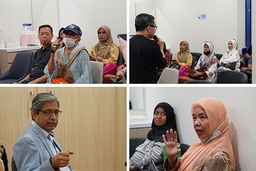GWS Medika Hosts Health Talk Addressing Stunting and Its Multifaceted Challenges

Despite a decline in stunting rates, Indonesia continues to face complex challenges in addressing this prevalent issue, with over one in three children affected.
Stunting, a condition resulting from growth failure caused by inadequate nutrition during pregnancy and early years of life, poses significant hurdles to a child's growth and development. GWS Medika, in an effort to tackle this problem, organized a health talk event on January 13, featuring Dr. Flora Ng, a pediatrician from Malaysia with extensive international experience.

Stunting is not solely attributed to poor nutrition but is closely linked to poverty, inadequate maternal health and nutrition, and inappropriate child care practices. The event emphasized the importance of nutrition, child hygiene, and government support in preventing stunting, highlighting the need for patience and long-term commitment.
Dr. Flora Ng, an MBBS graduate from the International Medical University in Malaysia, underscored the multidimensional nature of stunting causes, involving inadequate nutrition during pregnancy, early-life malnutrition, recurrent illnesses, and poor hygiene practices.

Stunting prevention is crucial due to its wide-ranging impacts, including lower cognitive performance, reduced adult income, increased risks of future nutrition-related chronic diseases, and suboptimal adult height.
Although there has been a decrease in global stunting rates from 40% in 1990 to 23% in 2016, 155 million children worldwide still experience stunting, particularly in Africa, South Asia, and Southeast Asia. Eradicating stunting is a long-term process involving changes in child growth and adult height, and the challenges encompass health, economic, and behavioral aspects.
Referencing data from the Ministry of Health, Dr. Flora, who holds a Master's in Pediatrics from the National University of Malaysia and certification from MRCPCH (UK), revealed that in Indonesia, more than one in three children suffer from stunting, with over 8 million experiencing suboptimal growth.
This condition is noticeable during pregnancy and typically manifests around the age of 2. Stunting prevention efforts should address three critical moments: before pregnancy, during pregnancy, and after birth, involving child nutrition, hygiene to reduce the risk of illness or infection, and government program support.
Key preventive measures include breastfeeding for a minimum of 6 months, providing adequate nutrition to both mothers and infants, paying attention to complementary feeding and solid foods with balanced nutrition, and avoiding early introduction of salty foods to prevent unhealthy eating habits in adulthood.
Dr. Flora emphasized that reducing stunting is a gradual process requiring patience and long-term commitment. Despite a 20% decline in stunting cases in Indonesia from 2014 to 2023, it is vital to remember that stunting prevention is a long-term endeavor, and sustained community support and government programs are crucial. She cited the post-war Japanese government, which took 40 years to address stunting comprehensively, as an illustrative example.



